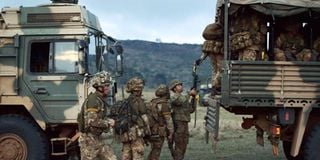Premium
Batuk military base on lockdown amid new virus fears

Soldiers climb into a military truck during a simulated military exercise of the British Army Training Unit in Kenya (Batuk), together with the Kenya Defence Forces (KDF), at the ol-Daiga ranch in Laikipia County.
What you need to know:
- Following the discovery of the cases, Colonel Paul Gilby, the Batuk garrison commander, ordered 48 hours of “enhanced isolation” which will also affect about 550 Kenyans working at the Batuk’s Nyati Barracks.
A British military base in Nanyuki was placed on total lockdown on Monday after fears spread that soldiers who arrived in the country last week might have come with the new variant of the coronavirus.
The new strain, first recorded in the UK on December 14 and reported to be 70 percent more transmissible than the one in Kenya, has been blamed for harsher Covid-19 restrictions and travel bans in London.
“Batuk (British Army Training Unit in Kenya) camp has been placed into enhanced isolation after a very small number of soldiers tested positive for Covid-19,” the British High Commission in Nairobi said in a statement without giving absolute numbers.
“All personnel had conducted a period of isolation and tested negative prior to travelling to Kenya.” Batuk temporarily stopped its training in Kenya from March last year due to the pandemic until last month when the troops started returning.
On Monday, the British High Commission in Kenya did not respond to our queries whether the soldiers had been infected with the new variant, only saying that tests were still being carried out. High Commissioner Jane Marriott tweeted that some of the troops in isolation will be released upon testing negative.
“We are partnering with authorities and local community to minimise risks,” Ms Marriott said.
However, the Laikipia County Government— under which the British camp in Nanyuki lies and which has the primary responsibility of responding to coronavirus issues— said it was only offering “oversight” in the matter.
“Both the Kenya Defence Forces and Batuk have their own measures and isolation and quarantine. Our mandate is strictly to oversight the progress and that is what we are doing,” Health Chief Officer Donald Mogoi said.
Training yet to begin
The British troops were supposed to start training with their Kenyan counterparts but the programme, according to the Defence ministry in Nairobi, was yet to start.
Following the discovery of the cases, Colonel Paul Gilby, the Batuk garrison commander, ordered 48 hours of “enhanced isolation” which will also affect about 550 Kenyans working at the Batuk’s Nyati Barracks.
Batuk employs about 550 on contract and 3,000 casual workers per year. The Kenyans were told to work from home, dealing a new blow to efforts to reopen the military base. The size and scale of the Batuk operations in Kenya is only rivaled by Suffield in Canada and England’s Salisbury Plain. Batuk, a permanent training unit in Kenya with bases in Kahawa, Nairobi and Nanyuki, hosts up to six infantry battalions per year and is one of the main British defence assets in the country.
The base in Kahawa serves as a logistics and transport hub while Nanyuki provides the British military with a location for combined arms light role infantry battle group exercises and serves as a forward operating base and for conducting engineering tasks.
Battlegroup exercises take place across a 79,000 hectare ranch which boasts one of the largest live-firing training areas used by the British military.
The British soldiers come to Kenya several times a year, training with live fire at Archer’s Post in the and the expansive ranch.
They take part in challenging exercises in extreme conditions, battling temperatures up to 40 degrees in some of Kenya’s harshest terrains.
In recent years, infantry units were sent to Kenya for their final training before being deployed to Afghanistan and, for the “rapid reaction force” trainings.
The troops also engage in exercises like civil engineering projects and medical deployments to provide primary health care assistance to the local communities. The troops take about six-month postings, while some spend as many as two years.
Important partnership
Since the Defence Cooperation Agreement was signed in 2016, Batuk has contributed in over Sh5.8 billion to the local economy, according to a statement by Janet Sudi-Maina, the Communications Manager for Security and Stability at the British High Commission in Nairobi.
Last Wednesday, Ms Marriott said partnership between Kenya and the UK has been critically important with an aim of economically empowering the local community.
“Apart from their usual training, partnership with the local community is the heart of what Batuk do. We are keen on giving our children the best education and we will continue building on that community engagement,” Ms Marriott told Nation.
But the cooperation between the two countries has not always been rosy. Between 2013-2015, a series of diplomatic disputes between the UK and Kenya arose after the shooting of a local at the training camp in Nanyuki. The local was shot dead in 2013 by a British Army sergeant after he intruded on the UK training camp.
After the shooting, confusion arose whether British troops would have to abide by Kenyan or UK military law.
Kenyan authorities wanted the sergeant to stand trial in the country whereas the British said that their sergeant should be subject to military law and should return to the UK, arguing that the accused being a solder with Batuk, which is a department of the United Kingdom’s Ministry of defence, enjoyed sovereign immunity.
There have been claims that dozens of Kenyans(mainly herders) have been killed by unexploded British ordnance since 1945 when the agreement for training between Kenya and Britain was signed.






